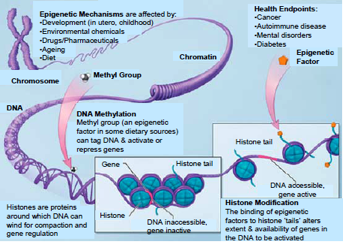
On epigenetics: We are not just our DNA
I first learned about epigenetics in a “fish bowl” meeting room at the University of Pennsylvania in the summer of 2013, when I worked as a research intern in the Ted Abel lab. We were in the middle of a weekly lab meeting, discussing if we need to buy a new sonication machine to do certain experiments. My research mentor, a fifth-year Ph.D. student, drew a strip of nucleosomes in my notebook and explained that the sonication process uses high-energy sound waves to grind up and remove proteins from DNA, which could be examined in later studies.
Another layer of control: the epigenome
It turns out that our genetic make-up is more dynamic than expected. Since Conrad Waddington first coined the term “epigenetics” in the 1940s, scientists have been discovering how one set of DNA expresses itself in different forms, leading to different organs and tissues in an embryo’s development. Something must happen to the DNA that causes it to differentiate.
DNA in our cells is packed up in a condensed string, which wraps itself around proteins called histones (see figure 1). The histones bunch together into complexes called chromatins, placing some genes on the interior and making them inaccessible for transcription. When the genes need to be transcribed, the chromatins unwind, leaving the genes accessible.
There are two forms of regulation that affect DNA and histones. One is histone modification, where specific molecules can bind and change the compaction pattern of histones, exposing DNA string parts that were previously hidden, or wrapping up other string parts tighter. Another is DNA methylation, an enzymatic process that works directly on the DNA by adding or removing “tags” called methyl groups to switch the genes under effect on or off. These two forms of regulation, combined with five families of histones and millions of potential methylation sites, create countless epigenetic possibilities that contribute to the diversity of our world.
http://blogs.plos.org/thestudentblog/2016/03/11/epigenetics/
Geen opmerkingen:
Een reactie posten